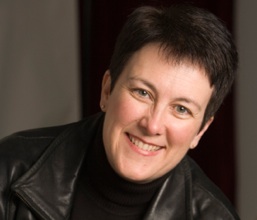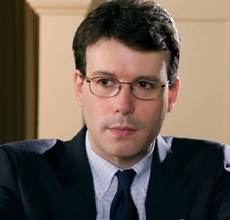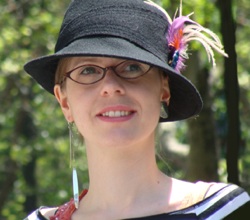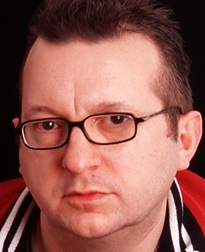Promise fulfilled—Santa Cruz Festival delivers
The Cabrillo Festival of Contemporary Music opened in Santa Cruz August 6 and 7 with two well-balanced programs, running the gamut from energetic virtuosos to dark and disturbing excursions.
On a Wire
 Jennifer Higdon, a festival favorite and recent Pulitzer Prize winner, had a strong work each night. Written for the hip contemporary classical group, eighth blackbird, Higdon’s On a Wire was the Friday night centerpiece. She chose a concerto form to highlight each instrument in the ensemble, with the orchestra seamlessly moving in and out to reprise motifs and underscore the sextet.
Jennifer Higdon, a festival favorite and recent Pulitzer Prize winner, had a strong work each night. Written for the hip contemporary classical group, eighth blackbird, Higdon’s On a Wire was the Friday night centerpiece. She chose a concerto form to highlight each instrument in the ensemble, with the orchestra seamlessly moving in and out to reprise motifs and underscore the sextet.
Higdon, one of this country’s most-performed living composers, often turns her talents to texture, eschewing themes or motifs. But the careful orchestration and moments of lyricism supplied a living structure to notes that often seemed incidental.
Titled to poke fun at the name of the hot young performers, On a Wire also referred to the opening and symmetrical closing of the work. The six gathered around Lisa Kaplan’s piano, and, backs to the audience, reached inside to slowly bow the piano strings. With an eerie purity that filled the Civic Auditorium, single notes turned to harmonies, and then built into “dirty” organ-like chords.
Kaplan began to add rhythms with keyboard strokes damped, dull thuds of notes. Percussionist Matthew Duvall took up the beat and elaborated, playing a piano’s action with drumsticks. They exploded into a rhythm section, and conductor Marin Alsop added her fabled percussionists, thickening a joyous olio.
Higdon showed her love of piquant textures—bright clarinet with sandpaper blocks, lyrical cello phrases with bowed cymbal and plucked piano. A viola line took soaring flight as bass clarinet ended phrases with marimba trills. This was celebratory fare.
After standing ovations eighth blackbird returned with a simpler broth, the eighth movement of Thirteen Ways by Thomas Albert, who was present. Written to the Wallace Stevens poem that gave eighth blackbird their name, Albert used bouncy rhythms and tart textures. Violist Matt Albert tuned his strings to barnyard scales and Timothy Munroe added birdsong accents on piccolo. It was the perfect encore, humorous and light-footed.
 The night opened with Mark-Anthony Turnage’s Scherzoid. Alsop asked for his remarks beforehand, and he spoke to the title, a play on schizoid and scherzo. “My original sketches changed personality midway through. It’s much better balanced now, but I still like the title—even if it’s against the Trade Descriptions Act.”
The night opened with Mark-Anthony Turnage’s Scherzoid. Alsop asked for his remarks beforehand, and he spoke to the title, a play on schizoid and scherzo. “My original sketches changed personality midway through. It’s much better balanced now, but I still like the title—even if it’s against the Trade Descriptions Act.”
Despite that disclaimer, the work did shift genre—and personality—every few bars while maintaining an unrelenting pace. Jazz, swamp, big band and movie sound tracks peeped out from an urban fabric, a chaos of horns and traffic. Originally composed of alternating lights and darks, Turnage turned those mood disorders into multiple personalities. Although they did agree on the ending.
After intermission, Michael Hersch was interviewed about the darkness of his Symphony No. 3. “Back story? Or the music’s emotional and psychological underpinnings? I don’t think it strengthens or weakens the artistic merit, but it was from a trauma in my life…the artistic life is not divorced from the rest (of life).”
This was not a sweet sadness. Nearly unbearable, it spoke to the kind of injury from which one does not heal. A deep hurt which we hold tight to ourselves, a hurt that names us.
A sudden bang on untuned drum was meant to be shocking. The orchestra gathered to a slow thickness, a tension of dread, with shimmer and slick of violins. Trumpets cascaded sharply down, silvered threads among low strings.
In a slower movement, contrabassoon groaned low. Hersch explored a dark realm filled with bass drones and euphonium and punctuated by timpani. Percussionist Steve Hearn, a Cabrillo regular, began to beat two drums with full force, a sound out of proportion and relentless: four beats, four rests, four more beats. Dread added its commentary: a sense of crushing mechanization, a march across life’s rhythms.
They ended on bass drone.
Rewind
 On Saturday, Aug 7, Higdon and Turnage returned to Cabrillo in a marvelous sequel to Friday’s concert. Higdon offered her Percussion Concerto with Colin Currie as the jaw-dropping percussionist. Turnage returned with two powerful works, Chicago Remains, a gritty portrait of that city, and Drowned Out, with Friday’s dread turning to Saturday’s panic.
On Saturday, Aug 7, Higdon and Turnage returned to Cabrillo in a marvelous sequel to Friday’s concert. Higdon offered her Percussion Concerto with Colin Currie as the jaw-dropping percussionist. Turnage returned with two powerful works, Chicago Remains, a gritty portrait of that city, and Drowned Out, with Friday’s dread turning to Saturday’s panic.
But they opened hospitably enough in Anna Clyne’s rewind. Horns slid like a Doppler shift of passing trains, and rhythmic rumbles alternated woodwind scumbling. Violins slurped and brass rose and fell. Composed to accompany dance, Clyne envisioned the abrupt flurries and freezes of a video on fast rewind. They swelled, and electronic chatter entered for a playful ending.
Currie took the stage with the throaty flutter of low marimba. Holding two mallets spread in each hand, his intervals thrummed into existence and faded away. A jangle of tubular bells answered, followed with xylophone and timpani. Rather than a narrow concerto form, Higdon posed a true dialogue between soloist and section, which the orchestra enriched.
Currie traded light sticks for heavy, running fluid marimba with skipped notes for odd scales like the erasure that embroiders Arabic octagonal patterns. Moving across the stage to cowbells, he reiterated those thoughts, then settled on a drum-set for a display of virtuosity on bongos, bass and high hat that brought cheers. Through slow movement and finale Higdon crafted her textures. Xylophone and bowed cymbal painted a metallic nimbus around flute and bassoon. A marimba’s wood was sweetened with violin and brandied with brushed snare.
Inspired by a Carl Sandberg poem, Turnage wrote Chicago Remains, and the history and energy of that city are captured in his tone poem. Bounced bows and the sounds of foundry painted his urban tensions, with descending pairs of notes his repeated motif. Clarinets honked and brass flared and dimmed. A soprano sax and trumpet played from the wings to add depth.
They ended with Drowned Out, which Turnage mentioned was inspired by William Golding’s novel, Pincher Martin. He went on to state, “The idea of drowning…well, I’m an asthma sufferer.”
Evocative of mood, this work was heart pounding.
Five percussionists and trombone blasts added bottom and urgency; bass flute and sax made it personal. Turnage’s hypnotic motifs combined with chromaticism for an effect like a clairvoyant’s—inward turning and somewhat lurid. After working up to frenzied brass and crack of wooden blocks, they gentled to swells of deep-bowed cellos and long clarinet notes. And then struggled back into panic with strident violins, brake drum and grinder.
From exuberant to very dark, the breadth of emotions found an enthusiastic audience, one that knew they were part of something historic.
—Adam Broner
A version of this article originally appeared in the Piedmont Post.
Photos from top: Jennifer Higdon, Michael Hersch, Anna Clyne and Mark-Anthony Turnage; photos courtesy of the Festival.
